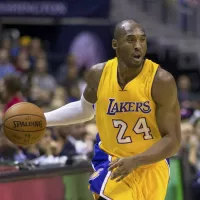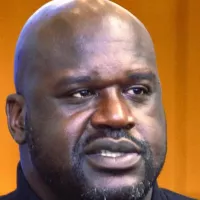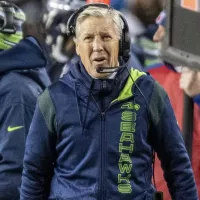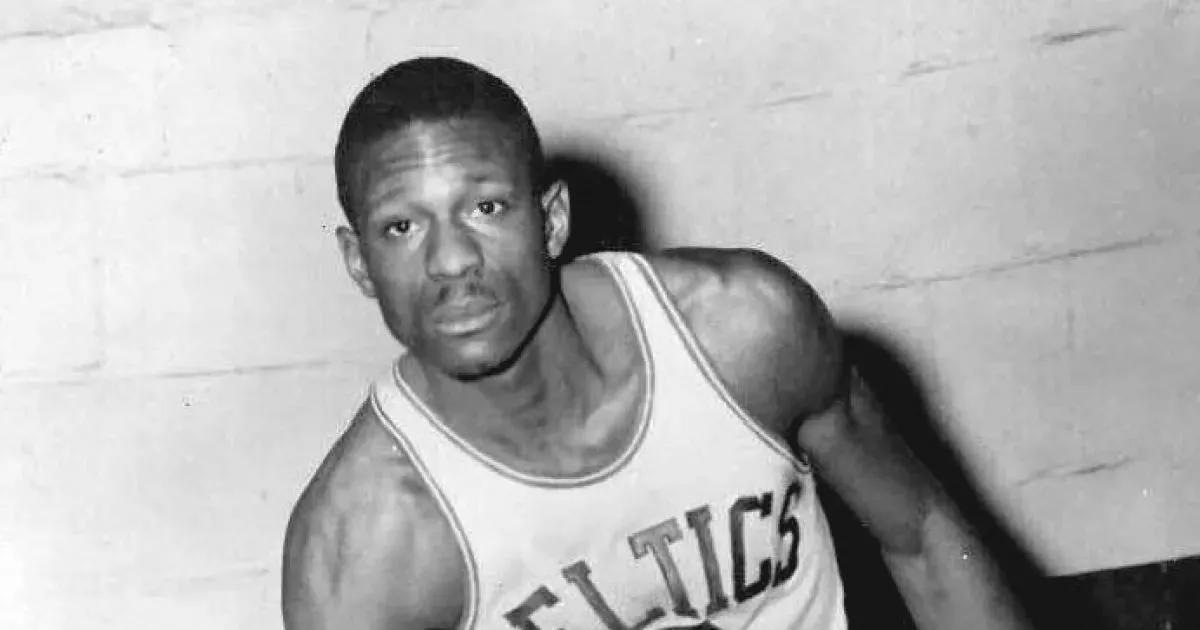A success timeline featuring the most significant achievements of Bill Russell.
Bill Russell was a dominant American professional basketball player, primarily a center for the Boston Celtics (1956-1969). He anchored the Celtics dynasty, leading them to an unprecedented 11 NBA championships in 13 years. Renowned for his exceptional defense, rebounding, and shot-blocking skills, Russell is regarded as one of the greatest basketball players ever.
1950: Celtics Make Playoffs
The 1969-70 NBA season was the first time since 1950 that the Celtics did not make the playoffs.
1955: NCAA Championship and Most Outstanding Player Award
In 1955, Bill Russell led USF to an NCAA championship and was named the NCAA Tournament Most Outstanding Player.
1955: Celtics' Worst Record Since 1956
In the 1968–69 NBA season, the Celtics 48–34 record was the team's worst since the 1955–56 NBA season
1956: Second NCAA Championship
In 1956, Bill Russell led USF to their second consecutive NCAA championship.
1956: Second NCAA Championship and Olympics
In 1956, Bill Russell led the San Francisco Dons to a second consecutive NCAA championship and was named NCAA Tournament Most Outstanding Player. He also captained the gold medal-winning U.S. national basketball team at the Summer Olympics that year.
1956: 1956 NBA season
In 1956, Bill Russell played 48 games, averaging 14.7 points per game and a league-high 19.6 rebounds per game.
1956: NCAA championship and Olympic gold medal
In 1956, Bill Russell won the NCAA championship with USF and an Olympic gold medal, marking a successful year.
1956: Captain of U.S. Olympic Basketball Team
In 1956, before his NBA rookie year, Bill Russell captained the U.S. men's Olympic basketball team at the Summer Olympics in Melbourne, Australia, overcoming challenges to participate.
November 16, 1957: NBA Record: Rebounds in One Half
On November 16, 1957, Bill Russell set the NBA record for rebounds in one half with 32 against Philadelphia. He still holds the record.
1957: NBA Title with Celtics
In 1957, Bill Russell won the NBA title with the Celtics, his first NBA championship.
1957: Celtics win the 1957 NBA Championship
In 1957, the Celtics secured their first NBA championship by defeating the St. Louis Hawks in a highly competitive Game 7 of the NBA Finals. Russell's defensive efforts, including the famous "Coleman Play", and Heinsohn's scoring prowess were instrumental in the victory. Auerbach was also fined for punching his colleague Ben Kerner.
1957: First NBA Championship
In 1957, with Russell as the starting center, the Boston Celtics won their first NBA championship.
1957: 1957-58 NBA Season
In the 1957-58 NBA season, the Celtics won fourteen straight games, and Russell averaged 16.6 points per game and a league-record average of 22.7 rebounds per game. He was voted the NBA Most Valuable Player.
1958: Russell selected to All-NBA Second Team
In 1958, Bill Russell was selected to the All-NBA Second Team.
1958: 1958-59 NBA season
In the 1958-59 NBA season, Bill Russell averaged 16.7 points per game and 23.0 rebounds per game.
November 7, 1959: Russell vs. Chamberlain: "The Big Collision"
On November 7, 1959, Bill Russell's Celtics hosted Wilt Chamberlain's Warriors in a highly anticipated matchup dubbed "The Big Collision." While Chamberlain outscored Russell, the Celtics won the game, marking the beginning of a great basketball rivalry.
1959: Start of Eight Consecutive Championships
From 1959 to 1966, with Bill Russell playing a central role, the Celtics won an NBA record eight consecutive championships.
1959: NBA Finals Rebound Record
In 1959, Bill Russell achieved the NBA Finals record for highest rebound per game average at 29.5.
1959: Russell becomes first NBA player to visit Africa
In 1959, Bill Russell became the first NBA player to visit Africa.
1959: Celtics Win the 1959 NBA Championship
In 1959, Bill Russell led the Celtics to capture the NBA title, sweeping the Minneapolis Lakers 4-0.
1959: Russell wins NBA MVP award and selected to All-NBA First Team
In 1959, Bill Russell won his first NBA MVP award and was selected to the All-NBA First Team.
February 5, 1960: Russell's Record-Breaking Rebound Performance
On February 5, 1960, Bill Russell achieved 23 points, 51 rebounds, and 5 assists in a game against the Syracuse Nationals, setting a record for most rebounds in a single game at the time.
March 29, 1960: NBA Finals Record: Most Rebounds
On March 29, 1960, during a game against St. Louis, Bill Russell achieved the NBA Finals single-game record for most rebounds, with 40.
April 9, 1960: Consecutive Games with 20+ Rebounds Start
On April 9, 1960, Bill Russell began a streak of 15 consecutive games with 20 or more rebounds, lasting until April 16, 1963, an NBA record.
November 24, 1960: Chamberlain Breaks Rebound Record; Celtics Win
On November 24, 1960, Wilt Chamberlain grabbed 55 rebounds against Bill Russell, breaking Russell's single-game rebound record. Despite this, Russell led the Celtics to a 132–129 win over the Philadelphia Warriors.
1960: Russell selected to All-NBA Second Team
In 1960, Bill Russell was selected to the All-NBA Second Team.
1960: 1960-61 NBA season
In the 1960-61 NBA season, Bill Russell averaged 16.9 points and 23.9 rebounds per game, leading his team to a regular season mark of 57-22.
1961: Russell wins NBA MVP award
In 1961, Bill Russell won his second NBA MVP award.
1961: Celtics Win 1961 NBA Championship
In 1961, the Celtics defeated the Syracuse Nationals 4-1 in the Eastern Division finals and won the 1961 NBA Finals in five games against the Los Angeles Lakers.
1961: 1961-62 NBA season
In the 1961-62 NBA season, Russell scored a career-high 18.9 points per game, accompanied by 23.6 rebounds per game.
April 18, 1962: NBA Finals Record: Most Rebounds, Quarter
On April 18, 1962, Bill Russell set the NBA Finals record for most rebounds in a quarter with 19 and tied the record for most rebounds in a game with 40, both against Los Angeles.
1962: Russell selected to All-NBA Second Team
In 1962, Bill Russell was selected to the All-NBA Second Team.
1962: Celtics become first team to win 60 games
In 1962, the Celtics became the first team to win 60 games in a season. Russell was voted as the league's MVP.
1962: 1962 NBA Finals
In 1962, the Celtics faced the Los Angeles Lakers in the NBA Finals, splitting the first six games. In Game 6, Russell recorded his first career triple-double and in Game 7, Russell finished with 30 points and 40 rebounds to win the series in overtime after a missed shot by the Lakers at the end of regulation.
February 10, 1963: Russell Records First Regular Season Triple-Double
On February 10, 1963, Bill Russell recorded his first regular season triple-double, posting 17 points, 19 rebounds, and 10 assists in a win against the New York Knicks.
April 16, 1963: End of Consecutive Games with 20+ Rebounds
On April 16, 1963, Bill Russell's NBA record streak of 15 consecutive games with 20 or more rebounds came to an end, having started on April 9, 1960.
1963: Russell wins NBA MVP award and selected to All-NBA First Team
In 1963, Bill Russell won another NBA MVP award and was selected to the All-NBA First Team.
1963: 1963-64 NBA Season
In the 1963-64 NBA season, the Celtics posted a league-best 58–22 record in the regular season. Russell scored 15.0 points per game and grabbed a career-high 24.7 rebounds per game, leading the NBA in rebounds.
1964: Russell selected to All-NBA Second Team
In 1964, Bill Russell was selected to the All-NBA Second Team.
1964: 1964-65 NBA Season
In the 1964-65 NBA season, the Celtics won a league-record 62 games.
March 11, 1965: Russell Grabs 49 Rebounds in a Game
On March 11, 1965, Bill Russell had 49 rebounds in a 112-100 win over the Detroit Pistons, tying for the third-most in a single game in NBA history.
1965: Russell wins NBA MVP award and selected to All-NBA First Team
In 1965, Bill Russell won his fifth NBA MVP award and was selected to the All-NBA First Team.
1965: 1965 NBA Playoffs
In 1965, during the Eastern Division finals against the Philadelphia 76ers, Bill Russell held Wilt Chamberlain to limited scoring in Game 3 and contributed significantly in Game 5 with 12 points, 28 rebounds, 7 assists, 10 blocks, and 6 steals. Blocks and steals became officially recorded statistics in the 1973–74 NBA season.
1966: Russell selected to All-NBA Second Team
In 1966, Bill Russell was selected to the All-NBA Second Team.
1966: Celtics Win the 1966 NBA Championship
In 1966, The Celtics won their eighth consecutive title after defeating the Los Angeles Lakers in Game 7 of the NBA finals.
1966: End of Eight Consecutive Championships
In 1966, the Celtics concluded their run of eight consecutive NBA championships.
1967: Russell's Season Performance
In the 1967-68 NBA season, Russell averaged 12.5 points and 18.6 rebounds per game.
1968: Celtics Win 1968 NBA Finals
In 1968, Bill Russell led the Boston Celtics to a 4-2 victory over the Los Angeles Lakers in the NBA Finals, securing his tenth title in twelve years. Russell was named Sports Illustrated's Sportsman of the Year for his efforts.
1968: Russell named "Sportsman of the Year"
In 1968, Bill Russell was named "Sportsman of the Year" by Sports Illustrated.
1968: Celtics Overcome 3-1 Deficit to Beat 76ers
In the 1968 NBA playoffs, the Celtics rallied from a 3-1 deficit to defeat the Philadelphia 76ers in the Eastern Division finals after Martin Luther King Jr.'s assassination, marking the first time in NBA history that a team lost a series after leading 3-1.
1969: Russell's Last Championship and Retirement
In 1969, Bill Russell helped the Celtics win another NBA championship and then retired from playing and coaching.
1969: Russell selected to NBA All-Defensive First Team
In 1969, during his last season, Bill Russell was selected to the NBA All-Defensive First Team, the inaugural year for the selection of All-Defensive Teams.
1969: Celtics Win 1969 NBA Finals
In the 1969 NBA Finals, Russell led the Celtics to an upset victory over the Los Angeles Lakers despite trailing in the series. His strategic adjustments and motivational tactics helped secure the championship.
1970: Russell makes NBA 25th Anniversary Team
In 1970, Bill Russell was named to the NBA 25th Anniversary Team.
1970: Russell named "Athlete of the Decade"
In 1970, The Sporting News named Bill Russell the "Athlete of the Decade".
1971: Selection into the NBA 25th Anniversary Team
In 1971, Bill Russell was selected into the NBA 25th Anniversary Team.
March 12, 1972: Jersey retired by Celtics
On March 12, 1972, the Boston Celtics retired Bill Russell's jersey No. 6, which he also wore at USF and for the 1956 U.S. Olympic team.
1973: Blocks and Steals become officially recorded statistics
In the 1973-74 NBA season, blocks and steals became officially recorded statistics.
1975: Refusal to attend Hall of Fame induction
In 1975, Bill Russell declined to attend his induction into the Hall of Fame, due to lingering negative feelings towards Boston.
1975: Inducted into Naismith Memorial Basketball Hall of Fame
In 1975, Bill Russell was inducted into the Naismith Memorial Basketball Hall of Fame, though he did not attend the ceremony.
1980: Russell declared "Greatest Player in the History of the NBA"
In 1980, Bill Russell was declared "Greatest Player in the History of the NBA" by the Professional Basketball Writers Association of America.
1980: Russell makes NBA 35th Anniversary Team
In 1980, Bill Russell was named to the NBA 35th Anniversary Team.
1980: Selection into the NBA 35th Anniversary Team
In 1980, Bill Russell was selected into the NBA 35th Anniversary Team.
1996: Named One of the 50 Greatest Players in NBA History
In 1996, Bill Russell was named as one of the 50 Greatest Players in NBA History.
1996: Russell makes NBA 50th Anniversary Team
In 1996, Bill Russell was named to the NBA 50th Anniversary Team.
1999: Russell Ranked No. 18 on ESPN's "50 Greatest Athletes of the 20th Century" List
In 1999, Bill Russell was ranked No. 18 on ESPN's "50 Greatest Athletes of the 20th Century" list.
November 17, 2006: Inducted into National Collegiate Basketball Hall of Fame
On November 17, Bill Russell was inducted into the founding class of the National Collegiate Basketball Hall of Fame.
2006: Induction into National Collegiate Basketball Hall of Fame
In 2006, Bill Russell was one of the founding inductees into the National Collegiate Basketball Hall of Fame.
May 20, 2007: Honorary Doctorate from Suffolk University
On May 20, 2007, Bill Russell received an honorary doctorate from Suffolk University and served as commencement speaker.
June 7, 2007: Honorary Degree from Harvard University
On June 7, 2007, Bill Russell was awarded an honorary degree from Harvard University.
June 18, 2007: Inducted into FIBA Hall of Fame
On June 18, 2007, Bill Russell was inducted as a member of the founding class of the FIBA Hall of Fame.
2007: Enshrinement in FIBA Hall of Fame
In 2007, Bill Russell was enshrined in the FIBA Hall of Fame.
2007: Russell voted third best center of all time by ESPN
In 2007, Bill Russell was voted the third best center of all time by ESPN behind Abdul-Jabbar and Chamberlain.
December 2008: We Are Boston Leadership Award
In December 2008, Bill Russell was honored with the We Are Boston Leadership Award, recognizing his contributions and impact.
2008: Golden Plate Award
In 2008, Bill Russell received the Golden Plate Award of the Academy of Achievement, recognizing his significant contributions.
February 14, 2009: NBA Finals MVP Award Renamed
On February 14, 2009, NBA Commissioner David Stern announced that the NBA Finals Most Valuable Player Award would be renamed the Bill Russell NBA Finals Most Valuable Player Award in his honor.
June 14, 2009: Honorary Degree from Dartmouth College
On June 14, 2009, Bill Russell received an honorary degree from Dartmouth College, adding to his collection of academic honors.
2009: NBA Finals MVP award named after Russell
During the NBA All-Star Weekend on February 14, 2009, NBA Commissioner David Stern announced that the NBA Finals MVP award would be named after Bill Russell.
2009: Russell named third best player of all-time by Slam
In 2009, Slam named Bill Russell the third best player of all-time behind Jordan and Chamberlain.
2009: NBA Finals MVP Award Renamed in His Honor
In 2009, the NBA renamed the NBA Finals MVP Award in honor of Bill Russell.
2010: Russell named a recipient of the Presidential Medal of Freedom
In 2010, Bill Russell was named as a recipient of the Presidential Medal of Freedom.
2011: Awarded the Presidential Medal of Freedom
In 2011, Barack Obama awarded Bill Russell the Presidential Medal of Freedom for his achievements in basketball and contributions to the civil rights movement.
June 15, 2017: Russell announced as inaugural recipient of NBA Lifetime Achievement Award
On June 15, 2017, Bill Russell was announced as the inaugural recipient of the NBA Lifetime Achievement Award.
November 15, 2019: Acceptance of Hall of Fame ring
On November 15, 2019, Bill Russell accepted his Hall of Fame ring in a private ceremony with his family, marking a shift in his relationship with the honor.
2020: Russell Ranked No. 4 in ESPN's List of Top 74 NBA Players
In 2020, Bill Russell was ranked No. 4 in ESPN's list of the top 74 NBA players of all time.
October 2021: Russell honored as one of the league's 75 greatest players of all time
In October 2021, Bill Russell was honored as one of the league's 75 greatest players of all time.
2021: Hall of Fame Induction as Coach
In 2021, Bill Russell attended his induction into the Basketball Hall of Fame as a coach, marking a unique recognition of his coaching career.
2021: Russell makes NBA 75th Anniversary Team
In 2021, Bill Russell was named to the NBA 75th Anniversary Team.
2021: Selection to the NBA 75th Anniversary Team and Second Hall of Fame Induction
In 2021, Bill Russell was selected to the NBA 75th Anniversary Team and was inducted into the Naismith Memorial Basketball Hall of Fame a second time for his coaching career.
August 11, 2022: Russell's No. 6 jersey retired throughout the NBA
On August 11, 2022, it was announced that Bill Russell's No. 6 jersey would be retired throughout the National Basketball Association, the first time a jersey had been retired league-wide in NBA history.
2022: Russell Ranked No. 6 in ESPN's NBA 75th Anniversary Team List
In 2022, Bill Russell was ranked No. 6 in ESPN's NBA 75th Anniversary Team list, and No. 4 in a similar list by The Athletic.
2022: NBA Retired Russell's #6 Jersey League-Wide
Shortly after his death in 2022, the NBA retired Bill Russell's #6 jersey league-wide, an honor only given to a select few.
2024: Franchise Leader in Rebounds
As of 2024, Bill Russell leads the Celtics franchise in career rebounds, minutes per game (42.3), and rebounds per game, solidifying his place in Celtics history.
Mentioned in this timeline

Basketball is a team sport played on a rectangular court...

Michael Jordan often known as MJ is a businessman and...

Kobe Bryant a legendary shooting guard dedicated his -year NBA...

Martin Luther King Jr was a pivotal leader in the...

Barack Obama the th U S President - was the...

Shaquille O'Neal also known as Shaq is a retired American...
Trending
2 months ago Rome man arrested after shooting at car in Verona, New York.

3 months ago Alex Eala Enters Hong Kong Campaign with Career-High Ranking, World No. 51

8 months ago Pete Carroll envisions Jeanty & Mostert as 'Thunder and Lightning' in Raiders backfield.

Dave Bautista born David Michael Bautista Jr is an American actor and retired professional wrestler He achieved significant recognition during...

3 months ago Ben Shelton faces Kamil Majchrzak at ATP Basel after Rune's setback: Predictions.

6 months ago Ryan Reynolds Hints at Deadpool Joining Avengers in Cryptic Instagram Post
Popular

Thomas Douglas Homan is an American law enforcement officer who...

William Franklin Graham III commonly known as Franklin Graham is...

Jupiter is the fifth and largest planet from the Sun...

XXXTentacion born Jahseh Dwayne Ricardo Onfroy was a controversial yet...

Instagram is a photo and video-sharing social networking service owned...

Kristi Noem is an American politician who has served as...
